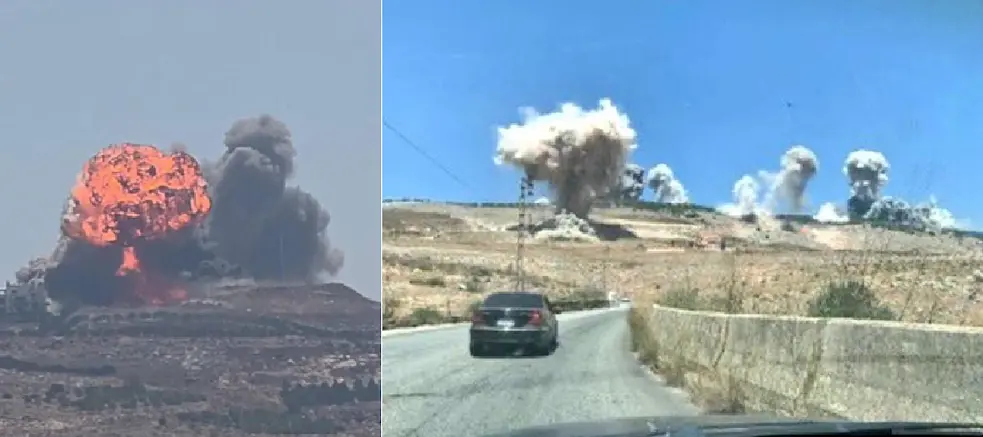
, Israeli airstrikes razed buildings in South Lebanon despite a standing ceasefire with Iran
Fire in the Sky: Israeli Jets Pound South Lebanon in Defiant Strike
On June 27, 2025, the skies over Nabatieh and surrounding towns in South Lebanon lit up with fire and smoke as Israeli fighter jets launched a wave of intense airstrikes, targeting what the Israeli military claimed were Hezbollah-linked sites. The strikes, which came just days after a Trump-brokered ceasefire between Israel and Iran, have been widely condemned as a blatant violation of the truce and a dangerous provocation in an already volatile region.
Footage from the scene shows entire buildings reduced to rubble, with civilians scrambling for safety amid the chaos. One of the most devastating strikes hit a broadcast transmission site used by Hezbollah-affiliated Al-Manar TV in the Niha hills, completely destroying the facility and disrupting communications across the region. Another drone strike in Kunin killed one man, while a separate attack in Nabatieh left a woman dead and over two dozen injured.
The Lebanese Health Ministry confirmed the casualties and accused Israel of targeting civilian infrastructure. Meanwhile, the Israeli Defense Forces (IDF) claimed the strikes were aimed at dismantling Hezbollah’s “terror infrastructure,” including observation posts and underground facilities near the border.
Ceasefire Cracks: Iran Truce Undermined by Escalating Israeli Offensives
The timing of the attack is particularly alarming. Just days earlier, Israel and Iran had agreed to a ceasefire following a 12-day exchange of missile and drone strikes that left dozens dead across both nations. Brokered by former U.S. President Donald Trump, the truce was hailed as a diplomatic breakthrough, with hopes that it would de-escalate tensions across the Middle East.
However, since the ceasefire took effect on June 24, Israel has reportedly violated the agreement over 3,000 times, according to Lebanese media sources. These violations include airspace incursions, drone surveillance, and targeted strikes across southern Lebanon, raising questions about the ceasefire’s legitimacy and Israel’s commitment to peace.
Hezbollah, while publicly committed to the truce, has warned that continued Israeli aggression could force a military response. A spokesperson for the group stated that while Iran is capable of defending itself, Hezbollah reserves the right to act if Lebanese sovereignty continues to be violated.
The United Nations and European Union have expressed concern over the renewed hostilities, urging both sides to uphold the ceasefire and avoid actions that could spiral into a full-scale war. Yet, with civilian casualties mounting and infrastructure crumbling, the prospects for sustained peace appear increasingly bleak.
Regional Fallout: Lebanon’s Fragile Stability at Risk
The latest Israeli strikes have not only devastated communities in South Lebanon but also exacerbated Lebanon’s already fragile political and economic situation. The country, still reeling from years of financial collapse and political paralysis, now faces the added burden of rebuilding bombed-out towns and caring for displaced civilians.
The U.S. State Department has issued a new evacuation order for non-essential embassy staff in Beirut, citing the “volatile and unpredictable security situation”. Meanwhile, France and Turkey have called for the ceasefire to be made permanent, warning that the region cannot afford another catastrophic war.
Analysts fear that continued Israeli strikes could draw Hezbollah fully into the conflict, triggering a broader confrontation that might involve Iran, Syria, and other regional actors. The destruction of media infrastructure, including Al-Manar’s transmission hub, is seen by some as an attempt to silence Hezbollah’s narrative and control the information war.
For ordinary Lebanese citizens, the situation is dire. “We were just starting to rebuild our lives,” said a resident of Nabatieh. “Now we’re back to living in fear, not knowing when the next bomb will fall.”
Conclusion:
The Israeli airstrikes on South Lebanon mark a dangerous turning point in the region’s fragile peace. As buildings crumble and lives are lost, the world watches anxiously, hoping that diplomacy can prevail over destruction. But with ceasefire violations mounting and tensions escalating, the path forward remains uncertain and perilously close to the edge.
Stay updated with the latest news on Rapido Updates. Keep yourself updated with The World, India News, Entertainment, Market, Automobile, Gadgets, Sports, and many more